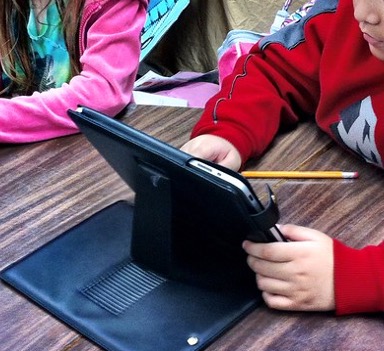OLEDIG
TED2021-132733B-I00
In the current panorama of increasingly digitized educational practices, the development of digital reading competence during compulsory education is essential, since it enables students to use different types of texts for personal and social purposes (INEE, 2020). We know that the digital reading proficiency levels of Spanish adolescents (PISA tests) are significantly lower (477) than the OECD average (487) and the EU average (489) and the downward trend in these levels between 2015 is worrying and 2018, with 19.1 points of descent, by 8.8 points in the OECD. It is necessary to analyze the problems associated with the development of competence in digital reading. We know that one of the great impacts that digital reading introduces is the greater difficulty in maintaining attention on the task. This is so not only because of the interactive characteristics of digital texts (eg hyperlinks), but also because of the tendency to generate non-task thoughts (e.g., "have I received any new messages?") while students interact with digital devices (Delgado & Salmerón, 2021). Thus, with the ultimate goal of getting adolescents to become competent digital readers, the project OLEDIG analyzes the problems associated with the development of digital reading competence using educational software and tries to cover the following objectives.
Project objectives:
1. To analyze the effectiveness of a program for the improvement of competence in digital reading.
1.1. To evaluate on a large scale in natural educational environments the effectiveness of a program for the improvement of adolescents' competence in digital reading.
1.2. To test the effectiveness of two instructional manipulations in maximizing attention during the digital reading task: (a) adjunct questions (questions available simultaneously with reading the text vs. after reading the text); and (b) feedback (with explicit warm control vs. without explicit warm control).
1.3. To Identify the differential effectiveness of some features of the program based on the general level of initial understanding of the participants.
2. To study with high precision tools (registration of eye movements and electroencephalographic recording) the reading processes in natural contexts of intervention in digital reading competence.
2.1. To analyze the evolution of the attentional processing indicators during the execution of the task at various moments in time during the development of the intervention program in digital reading competence.
2.2. Analyze the differentiated behavior of attentional processing indicators depending on the difficulty of the text.
How will we do it:
To achieve these objectives, two studies have been designed that meet general objectives 1 and 2 respectively. The first study will analyze the large-scale effectiveness of the partner company's digital reading literacy improvement program Intralíneas to which experimental manipulations will be introduced to examine sub-objective 1.2 through a sequence of 16 sessions (reading texts, answering questions and post-task mindwandering tests). The experimental design consists of two groups stratified by means of a randomized design per group, in which an experimental group (15 centers, 30 classrooms, 750 students) and a control group (15 centers, 30 classrooms, 750 students) will participate, which will receive the intervention, for ethical reasons, later. The effectiveness of the program will be assessed from the application of two different comprehension tests for the pre-test and for the post-test, respectively. In addition, vocabulary and working memory control measures will be taken.
In the second study, a subsample of 60 students from 7th to 10th Grade participating in the previous study will be evaluated (1) at the beginning of the training, (2) in the middle (after 8 training sessions), and (3) at the end (after 16 training sessions). In each session, the students will read two long multimedia texts (approx. 1000 words), one in an easy version and one in a difficult version, and they will answer 20 literal comprehension, inferential and evaluation questions (OECD, 2018) in multiple choice format. . To maximize the need to self-regulate reading, it will be indicated that they have limited time for it. During the reading process, students' electroencephalographic (EEG) activity and eye movements will be measured..
The results of both studies are expected to have a clear impact, both scientific-technical and socioeconomic, which will help to improve the digital transition in the educational field thanks to (1) the validation and optimization of a program to improve competence in digital reading of adolescents implemented on a large scale and (2) the analysis of the usefulness of advanced research technological tools (eye-tracking and EEG) to study reading processes in natural contexts and tasks.
Digital reading, reading competence, digitized education
- Salmeron Gonzalez, Ladislao
- PDI-Catedratic/a d'Universitat
- Vicedega/Vicedegana / Vicedirector/a Ets
- Gil Pelluch, Laura
- PDI-Titular d'Universitat
- Coordinador/a de Mobilitat
- Maña Lloria, Amelia
- PDI-Titular d'Universitat
- Director/a de Seccio Departamental
- Vicedega/Vicedegana / Vicedirector/a Ets
- Vergara Martinez, Marta
- PDI-Catedratic/a d'Universitat
Pablo Delgado, University of Sevilla
- Altamura Garcia, Lidia
- PI-Invest Formacio Predoc Ministeri













